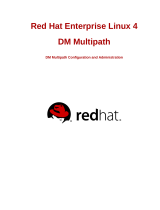
Overview of the agentless import process
Before importing the external storage from a source system to a PowerStore cluster, the active path for the host I/O is to the
source system. The host or hosts are not automatically added to the PowerStore cluster and must be added manually before
setting up the agentless import. During the setup of an agentless import, volumes are created on the PowerStore cluster that
match the specified volumes on the source system. However, unlike non-disruptive import, the host applications that access the
source system volume or volumes must be shut down manually and the source volumes brought offline.
NOTE: For host clusters, the source LUNs could have SCSI reservations keys. The SCSI reservations must be removed for
imports to be successful.
To start an agentless import, the destination volume must be manually enabled and the host application must be reconfigured to
use the destination volume instead of the source volume. The destination volume will be read-only until it is enabled. Once the
destination volume has been enabled, the host application has to be reconfigured to access the destination volume. Start the
import to copy the source volume data to the destination volume. The source system is kept updated through I/O forwarding
from the PowerStore cluster. When the import reaches the Ready For Cutover state, you can initiate the cutover. The I/O
forwarding from the PowerStore cluster to the source system ends when cutover is initiated.
Review the following processes to gain an understanding of the import procedure:
NOTE: You can also see the Importing External Storage to PowerStore video at https://www.dell.com/powerstoredocs.
1. Preconfigure – Set up the network connectivity.
● The connection between an existing Dell or Dell EMC source system and the PowerStore cluster must be over iSCSI.
● For Dell PS source systems – All the connections between the hosts and the Dell PS source system and between the
hosts and the PowerStore cluster must be over iSCSI.
● For Dell SC, or Dell EMC Unity, VNX2, XtremIO X1, XtremIO X2 source systems – The connections between the hosts
and the Dell SC, or Dell EMC Unity, VNX2, XtremIO X1, XtremIO X2 source system and between the hosts and the
PowerStore cluster must be either all over iSCSI or all over Fibre Channel (FC).
NOTE:
When FC connectivity between the host and source system and between the host and PowerStore cluster is
used, the administrator must set up FC zoning between the host and the PowerStore cluster.
2. Setup import – If they are not already listed, add the source system and the hosts to the PowerStore cluster. Select one or
more volumes or consistency groups, or both to be imported. A volume group cannot be combined with any other volumes
or volume group. Select to map the hosts that access the storage to be imported. Set the import schedule and assign a
protection policy.
3. Start import – A destination volume is created for each selected source volume. A volume group is automatically created
for each consistency group that is selected for import. When the destination volume is in the Ready To Enable
Destination Volume state, shutdown or take off line the host application on the applicable host or hosts that use
the source volume. Also, remove the host mapping to the applicable source system volume. Select and enable the destination
volume which is in the Ready To Enable Destination Volume state. Reconfigure the host application to use the
applicable destination volume. Select and Start Copy for the destination volume which is in the Ready to Start Copy
state.
NOTE:
It is recommended to remove the host mapping of the source volumes during the enable destination volume
process. If the host mapping of the source volumes is not selected for removal by the orchestrator, the mapping should
be removed manually. Also, only one agentless import can be processed from the PowerStore cluster at any point in time
until the import process reaches the Ready to Start Copy state. A second agentless import will start execution
only after the previous import reaches the Copy In Progress state.
4. Cutover import – Cutover can be performed only when the import processing state is Ready For Cutover. In other
words, cutover is a final confirmation. You can select to cut over automatically without user intervention.
In addition, the following actions are available during the import procedure:
● Pause import – Pause can be performed when the import processing state is Copy In Progress.
NOTE:
The Pause import action on a CG only pauses the member volumes that are in the Copy In Progress
state. The CG remains in the In Progress state. Other member volumes that are in other states, such as Queued
or In Progress, are not paused and may proceed to the Ready For Cutover state. The other member volumes
can be paused when they reach the Copy In Progress state by using the Pause import action again on the CG. If
any of the member volumes are in the Paused state but the overall status of the CG is In Progress, both the Pause
and Resume import action options are available for the CG.
● Resume import – Resume can be performed when the import processing state is Paused.
Introduction
11




















